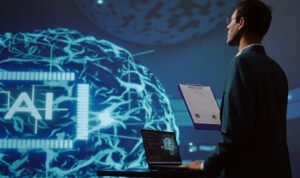In the words of Albert Einstein, “Education is not the learning of facts, but the training of the mind to think.” As we navigate the complexities of the 21st century, this perspective holds truer than ever, especially with the rise of artificial intelligence (AI) in education. AI is not just about automating tasks; it is reshaping how we teach, learn, and develop skills. Understanding the transformative potential of AI in education is essential for educators, administrators, and policymakers alike. Here are several key ways AI influences education and skill development in profound and innovative ways.
1. Personalised Learning Experiences
AI enables personalised learning by analysing individual student data to tailor educational experiences to their unique needs. For instance, adaptive learning platforms can adjust the difficulty of tasks based on a student’s performance, ensuring that each learner progresses at their own pace. This approach enhances engagement and helps students master concepts before moving on to more complex material. An example of this is the AI-powered reading assistant being implemented in Louisiana, which provides customised support to students struggling with literacy [1].
2. Intelligent Tutoring Systems
Intelligent tutoring systems (ITS) leverage AI to provide one-on-one support to students outside the classroom. These systems can offer explanations, feedback, and practice problems tailored to individual learning styles. For example, platforms like Carnegie Learning use AI to adapt math instruction based on real-time student performance, helping learners who may not have access to traditional tutoring resources [2]. This technology is particularly beneficial for students in remote or underserved areas with limited educational support.
3. Enhanced Teacher Support
AI is not only beneficial for students; it also supports educators by automating administrative tasks such as grading and attendance tracking. This automation allows teachers to focus more on instruction and student interaction. For instance, AI tools can analyse student performance data to identify those needing additional help, enabling timely interventions [1]. By reducing the administrative burden, AI empowers teachers to dedicate more time to fostering meaningful learning experiences.
4. Data-Driven Insights
AI analytics tools can process vast amounts of educational data to provide insights into student learning patterns and performance trends. Educators can use these insights to make informed decisions about curriculum design and instructional strategies. For example, predictive analytics can identify at-risk students, allowing educators to implement targeted support measures before issues escalate [3]. This proactive approach enhances student retention and academic success.
5. Bridging Educational Inequities
AI has the potential to address educational inequities by providing access to high-quality resources and personalised learning experiences, particularly in underfunded schools. For instance, the AI platform Squirrel AI Learning in China has significantly improved student performance by offering tailored lessons and materials that were previously unavailable to many learners [1]. By leveraging AI, educational institutions can work towards closing the achievement gap and ensuring that all students have the opportunity to succeed.






